|
|
|
Sort Order |
|
|
|
Items / Page
|
|
|
|
|
|
|
| Srl | Item |
| 1 |
ID:
146038
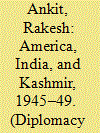

|
|
|
|
|
| Summary/Abstract |
This analysis offers an alternative examination of American interest in India in the mid-1940s and situates the early American attitude to Kashmir into that matrix. The two years from 1945 to 1947, those of the emergence of decolonisation and the Cold War, critically influenced America’s attitude first towards India and then towards Kashmir. It has been commonplace to describe America’s early understanding of the Kashmir conflict as an issue unconnected with the Cold War until 1952–1954. Even those works, which argue for an early presence of an “east-west lens” in the American consciousness, begin from either the Communist triumph in China or the outbreak of the Korean War. This analysis, instead, shows how soon, how much, and how comprehensively various sections of American government looked at Kashmir through an international prism.
|
|
|
|
|
|
|
|
|
|
|
|
|
|
|
|
| 2 |
ID:
191795
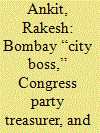

|
|
|
|
|
| Summary/Abstract |
S.K. Patil, quintessential Congressman of Bombay city and cabinet minister in three central governments from 1957 to 1963 and 1964 to 1967, was the kind of figure in Indian politics, who personified Rajni Kothari’s Congress “system” of clients-patrons and chains-links. A Patelite, Patil was a thorn in Nehru’s side. A leader of the business community, he identified with a network politics involving capital. He was an indifferent administrator, but an influential party apparatchik and his career peaked in 1964–1967, when he was a part of the all-important Congress “syndicate.” Afterward, however, he struggled for relevance in the turbulent decade of the 1970s. In this research article based on Patil’s personal papers, I offer these fragments from his political life as interesting prisms through which to view (a) aspects of intra-party and inter-ministerial conflictual culture, (b) issues concerning the top-down character of governance with implications for public policy and (c) the complex opposition to it, both inside and outside, thereby repaying this visit to an individual’s trajectory in contemporary history with parallels for current politics.
|
|
|
|
|
|
|
|
|
|
|
|
|
|
|
|
| 3 |
ID:
121419
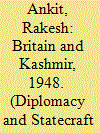

|
|
|
|
|
| Publication |
2013.
|
| Summary/Abstract |
The Jammu and Kashmir dispute of 1947-1949 between India and Pakistan became the first inter-state conflict to be discussed at the United Nations Security Council. This analysis looks at the views of the government and the delegation of Great Britain, one of the five permanent members of the Security Council, on Kashmir through the year of 1948. It argues that the British attitude was determined more by Imperial and Commonwealth strategic and ideological imperatives in South and Central Asia and the Middle East and less by the merits of the cases of the disputants. Operating within the twin backdrop of decolonisation and the Cold War, the British official mind juggled Kashmir's accession to India, India's complaint of aggression against Pakistan, and Pakistan's demand for a plebiscite in Kashmir with an eye to their own hopes and fears in a region that it understood as the key vantage on Communism and Islam.
|
|
|
|
|
|
|
|
|
|
|
|
|
|
|
|
| 4 |
ID:
193619


|
|
|
|
|
| Summary/Abstract |
By looking at the September 1949 devaluation dilemma faced by the governments of Pakistan and India, this article argues that it was an early episode of divergence between them following partition. The reasons why Pakistan did not devalue when India did so have remained largely obscured in the historiography. Deeply contested, the decision was a determining event through which the state staked its claim for economic sovereignty, internally and externally. It led to a 17-month-long official trade deadlock, especially in the eastern region of partitioned Bengal. It ended when the two governments established an exchange ratio for the two rupees, no longer at par with each other. This interactive delinking of currencies was symptomatic of the improvisational decoupling of the colonial subcontinent’s post-colonial states. In tracing its trajectory, this article contributes to the inconsiderable literature on why devaluation did not happen in Pakistan, revises the rationale offered, and presents the event as a contingent exercise in economic decolonization, generative of a post-colonial sovereign difference.
|
|
|
|
|
|
|
|
|
|
|
|
|
|
|
|
| 5 |
ID:
171864
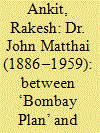

|
|
|
|
|
| Summary/Abstract |
Dr John Matthai held key ministerial offices in New Delhi during a time of transition from pre- to post-independent India. He was Finance Minister twice (1946, 1948–50) and, in between, held the portfolios of Industry & Supply and Railway & Transport. Matthai had been an academic in Madras, an administrator with the central government and an economist in Bombay with the Tata group. His wide expertise and diverse experience brought him a range of opportunities in those partisan times, including as Chairman of Taxation Enquiry Committee (1953) and State Bank of India (1955). Matthai’s ministerial appointments were unusual, his administrative challenges were unfavourable and his exit from government unexpected. In this article, I argue that his short-lived and scattered ministerial life and the record he left of it provides a unique vantage from which to view the interim times of 1946–1950 in India, with their paradigm of ‘continuity and change’.
|
|
|
|
|
|
|
|
|
|
|
|
|
|
|
|
| 6 |
ID:
095773
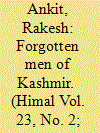

|
|
|
| 7 |
ID:
119382
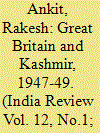

|
|
|
|
|
| Publication |
2013.
|
| Summary/Abstract |
In 1953, a book on Jammu and Kashmir titled The Grim Saga (Dasgupta & Co. Ltd.) came out in Calcutta, India. Its author, S. N. Shivpuri, lamented "the triple tragedy of Kashmir-local, subcontinental and international." Almost five decades since then, a great deal has been written about the local and subcontinental tragedy(s) in Kashmir. This article instead turns its gaze towards the international aspects that accompanied the evolution of the first India-Pakistan conflict over Kashmir from 1947-49, which sowed the seeds of the enduring dispute between the two countries. Focusing on the British policy towards Kashmir during this period, it contends that the impact of three wider, over-lapping contexts of international geopolitics, namely, British fears about unrest in the north-west of Indian subcontinent along the border with Afghanistan, British involvement in the Middle East, and British plans against the former Soviet Union, affected the official interpretation of British interest in Kashmir. These contexts, in turn, were created by the two themes of decolonization in South Asia and the Cold War in that pivotal year of 1947.
|
|
|
|
|
|
|
|
|
|
|
|
|
|
|
|
| 8 |
ID:
142830
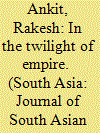

|
|
|
|
|
| Summary/Abstract |
This article focuses on Indo-British interactions at the United Nations during 1945–47, a significant and hitherto overlooked episode of India's transition within the British Commonwealth from a colony to a dominion. In this twilight period of the British Raj, India sent its first delegations onto the international stage—forays that were critically received by London and subsequently employed to anticipate New Delhi's global role in post-1945 international affairs. The delegations' delicate composition, combative activities and difficult interactions with their British counterparts established the diplomatic implications of decolonisation for London. The focus of existing literature on India's international identity at this time has been on the formulation of Jawaharlal Nehru's non-aligned approach to the Cold War. This article, instead, concentrates on its presentation and reception. Secondly, the story of India's presence at the UN usually begins with the Korean War (1950–53). This article shows that in fact it was in 1946–47 that the first impressions of the country's independent foreign policy were given by an interim Indian government. Based on the papers of Frederick Puckle, advisor on Indian affairs at the British Embassy in Washington (1943–47) and of Vijayalakshmi Pandit, leader of India's UN delegation, and supplemented by relevant official records, oral histories and memoirs, the article presents an unheralded facet of India's emerging independent identity in this period of pre-Independence.
|
|
|
|
|
|
|
|
|
|
|
|
|
|
|
|
| 9 |
ID:
171227


|
|
|
|
|
| Summary/Abstract |
This article offers a glimpse of the representation of India in The Pakistan Times in 1950–51, in the last months of the first phase of its editorship by Faiz Ahmed Faiz. It contextualizes this reflection in a period of relative lull, marked by pacts on minorities and trade, within the post-Partition upheaval. Focusing especially on editorials, commentaries, and cartoons, it highlights the formation of views of the neighbor from the news that was being generated. The stress is on firstly, a variety of themes included – not just the “unfinished business of Partition”, secondly, a responsible review of these themes – not just a narrow-minded nationalist reading, and thirdly, an involved – if not intertwined – interpretation of both countries’ socio-economic relations, while not underplaying the differences of their regimes. Further, the article goes beyond an inter-governmental framework, as The Pakistan Times went beyond it and presents a slice of the possibilities then existing, of a progressive politics on questions of class, community, and capital. In early independent Pakistan, this was personified by Faiz and this article, while not on him nor on an extensive Saidian reflection of the “other”, tries to trace his imprint in the representation of India in the newspaper he edited and seeks to contribute to our understanding of India as constructed through Pakistani eyes.
|
|
|
|
|
|
|
|
|
|
|
|
|
|
|
|
| 10 |
ID:
134743


|
|
|
|
|
| Summary/Abstract |
This article focuses on the shift in the attitude of the liberal American journalist Louis Fischer to India. It contrasts Fischer’s admiration of Mahatma Gandhi and his support for Indian independence, expressed vociferously and prolifically in the period 1942-47, with Fischer’s criticisms and eventual opposition to the personality and foreign policy of Jawaharlal Nehru, India’s first Prime Minister. Going beyond Fischer’s reputation as a “friend of India” earned through his works on Gandhi and his efforts for Indian independence, thus far considered as the only important prisms to study his views on India, this treatment of Fischer situates his criticism of Nehru within his personal development as an anti-communist in the late 1940s and 1950s. This shift in Fischer’s attitude from Gandhi to Nehru provides an interesting personal sidelight to the intergovernmental relations between India and America in that period.
|
|
|
|
|
|
|
|
|
|
|
|
|
|
|
|
| 11 |
ID:
146666
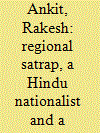

|
|
|
|
|
| Summary/Abstract |
DP Mishra, chief minister of Madhya Pradesh from 1963 to 1967 and twice minister in Central Provinces and Berar (1937–1939, 1946–1950), was a key figure in Congress politics and provincial governance from the pre- to the post-independence period in India. Mishra was a noted Patel acolyte and a vocal critic of Nehru. A Brahmin leader, he identified with an elite-based Hindu politics of caste and community. He was also an efficient administrator and his career peaked in 1966–1967 when he acted as a counsellor to Prime Minister Indira Gandhi. In this paper, I argue that his political life is an important prism through which to view Congress politics, its High Command culture, its character in provinces/states and its continuities with the colonial state in governance.
|
|
|
|
|
|
|
|
|
|
|
|
|
|
|
|
| 12 |
ID:
164044
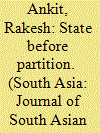

|
|
|
|
|
| Summary/Abstract |
This paper is a study of the Interim Government in British India, formed during the penultimate viceroyalty of Archibald Wavell, from September 1946 to March 1947. It tries to throw light on major and minor personalities and micro and macro processes at work in this improbable interlude and, thus, probes an overshadowed ministerial and bureaucratic set-up in the lead-up to Partition. This understudied set-up constituted yet another compelling ‘space before Partition’ which would continue to affect the Indian state after Partition. Simultaneously, the paper seeks to complicate the teleology and inevitability of Partition by showing this interim arrangement at work, which belied its name. Bringing together official texts and the personal interpretations of many participants, it approaches the period as liminal, albeit one with limitless possibilities at this juncture, of which what followed in 1947 was but one.
|
|
|
|
|
|
|
|
|
|
|
|
|
|
|
|
| 13 |
ID:
184786


|
|
|
|
|
| Summary/Abstract |
This article attempts a pre-history of the publication of The Transfer of Power documents through the 1960s. In doing so, it: (1) throws light on the external reasons and internal motivations at play for this pivotal production; (2) presents the other options considered and the formula eventually followed; and (3) illustrates the method by which the officials, librarians and historians involved went about including, excluding and editing the documents concerned. Through it all, the article seeks to trace the timeline, tease out the creative tensions and tackle the political imperatives of this attempt to influence historiography on the original transfer of power. Drawing upon official archives behind the emergence of this archival corpus, it concludes its analyses of this exercise of the late 1960s by drawing parallels with the emotions of the late 1940s and finds that the pride and prejudice displayed then fed the principles and pragmatism exhibited now.
|
|
|
|
|
|
|
|
|
|
|
|
|
|
|
|
|
|
|
|
|